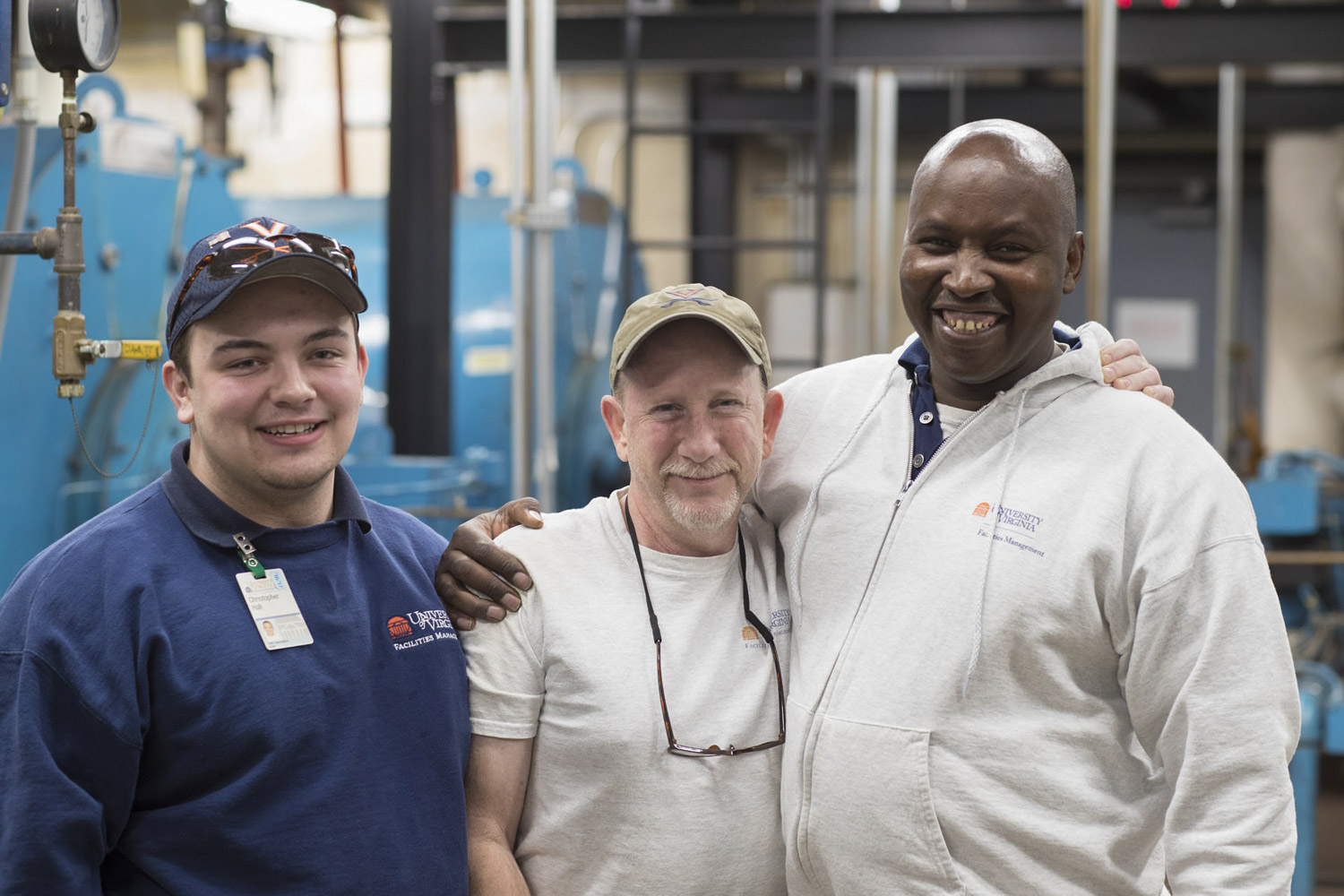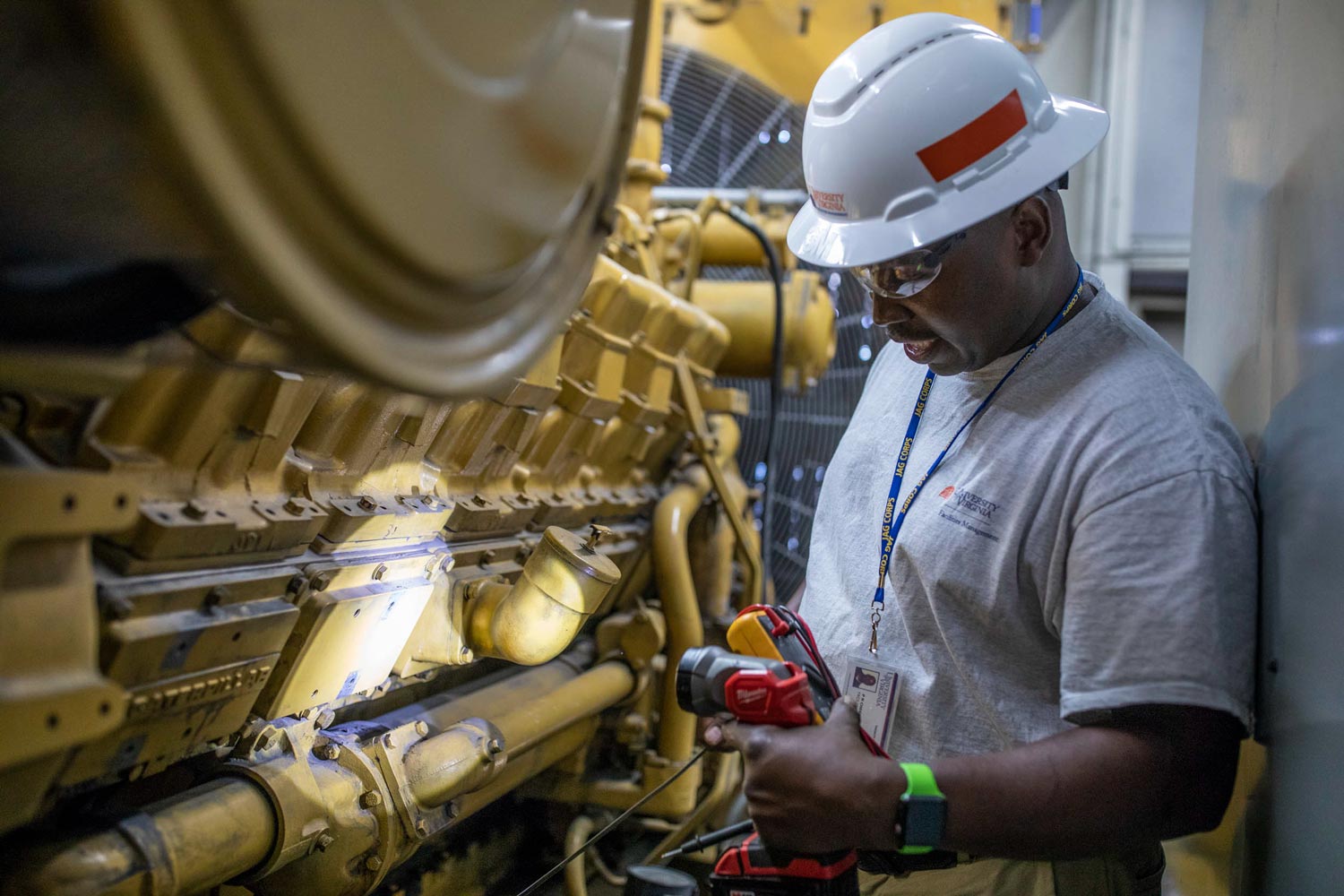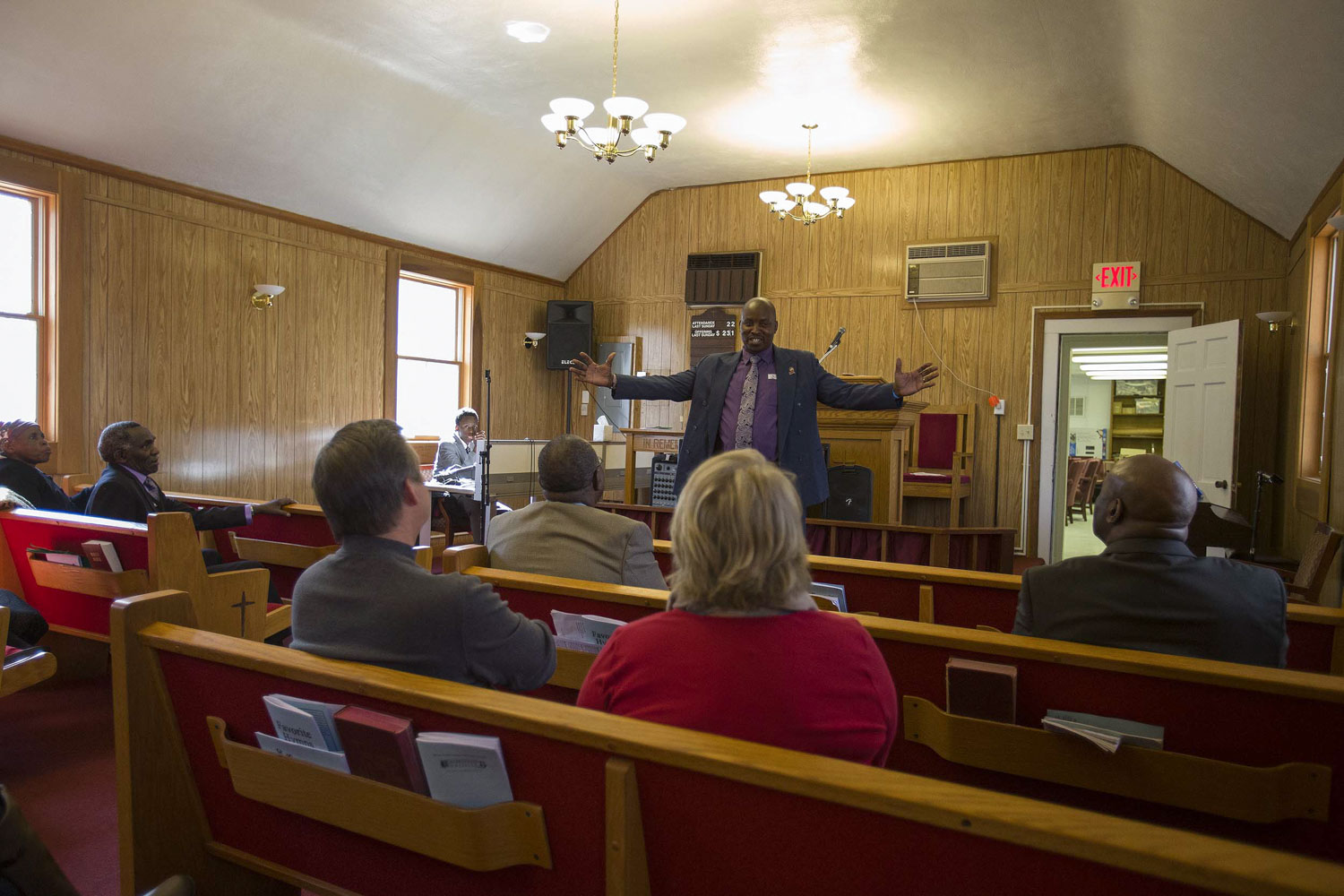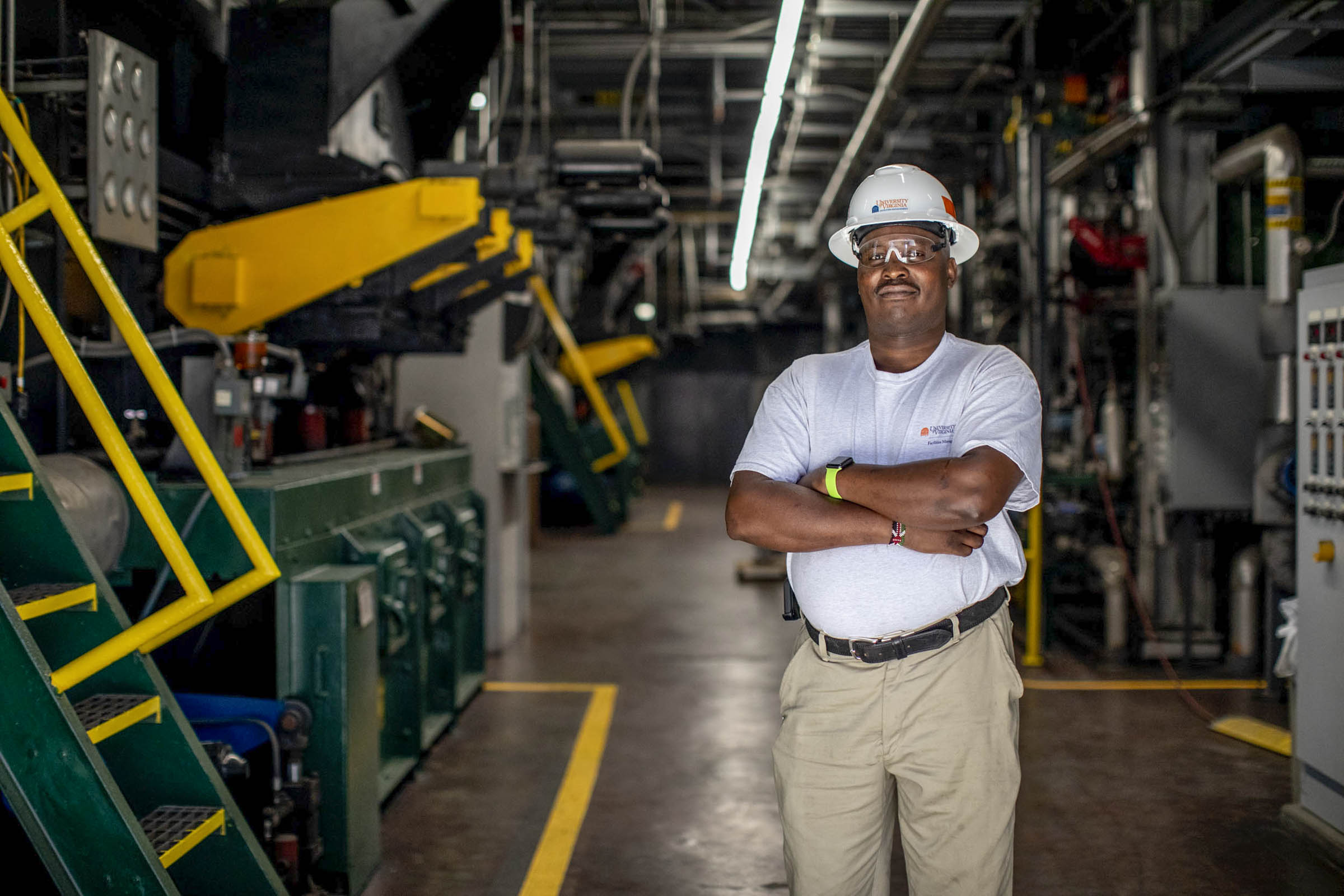Peter Chege grew up in a small village in Kenya without electricity, initially believing a nearby city was on fire because it was lit up at night.
Now he is an electrician at the University of Virginia.
Chege, a third-year apprentice electrician in UVA’s Facilities Management division, said he feels blessed by God for his passage from Kenya to UVA. Born outside Nyahururu, Kenya, in 1970, Chege was the oldest of 10 children, eight of whom lived into adulthood. He was raised in a grass hut, with one door, no windows and an open fireplace in the center. After dark, the family would light cloth wicks in small cans of diesel fuel.
“Life was very hard,” he said.
His remarkable journey to Grounds illustrates the power of curiosity, determination, persistence and opportunity.
“Education was key to everything,” Chege said. “I wanted a better life. I did not want to be poor anymore.”

Chege, right, with fellow apprentice Christopher Hall, left, and HVAC mechanic Bill Kardos. Co-workers describe Chege as endlessly curious and eager to learn. (Photo by Dan Addison, University Communications)
Growing up, Chege’s village was on a high hill, about 7,800 feet above sea level, and he could look down in the valley on Nyahururu, which had electricity.
“In the nighttime, the town would be lit up, and I wouldn’t know what it was,” he said. “I thought it was on fire, but my father was also a firefighter for the forestry department and I did not see him going to put it out.”
He was relieved to learn the city was not ablaze.
“I never wanted my dad gone for too long and if the city was indeed on fire, my dad would be gone forever,” he said. “But realizing that the city was connected to the power grid and we were not, and it was only eight kilometers from my village, angered me. It was one of the forms of social injustice that I had witnessed. After all, power lines traveled right by our village headed to an intelligence tower on the mountains.”
Electricity began to fascinate Chege, and he experimented with ways to generate it. He used old car batteries or bicycle dynamos, then tried wooden wind vanes to drive a dynamo and put soda ash in a pit latrine to generate a chemical reaction.
“We really never were very successful,” he said. “The most successful method seemed to be DC power using an old car battery. We tried to use more sulfuric acid, but we needed more lead batteries for real success. Unfortunately, we were using already-dead car batteries with depleted cells.”
In primary school, Chege traced his first letters in the dust, then used a piece of charcoal on a wall to write before graduating to pencil and paper.
Despite the family’s limited means, education remained important, and Chege’s father paid $100 every three months to send Peter to a boarding high school far from his home. His mother spoke Kikuyu, from Kenya’s dominant ethnic group. The country’s official language, Swahili, was taught in school. English was also taught in the schools when Chege was young, because Kenya had been a British colony. This multilingualism would serve him well later in life.
But Chege had no clear vision of how this was to happen and once he completed high school, he was on his own. He lived with an uncle in Nyahururu and worked as a clothing salesman, a voter registration clerk and applied unsuccessfully to join the Kenyan Air Force.
He also learned welding from his uncle, and while working as a welder in 1992, Chege met an American missionary who introduced him to Christianity. The missionary commissioned a welded baptismal font, which Chege built. He then became the first person to be baptized in it. Chege worked with the missionary and, because of his language skills, became a translator for him.
The missionary also spurred Chege’s interest in the U.S., showing him movies about America, many of which he did not understand, and others such as “Apollo 13” and some science-fiction films. In one, he recalled, the “aliens” spoke Kikuyu.
“To me, America was like a place out in outer space,” he said.
Chege also felt a calling to preach and became an intern/trainee at the missionary church, a job that lasted for four years until the missionary left Kenya in 1997. Chege, suddenly unemployed, broke his leg in a bus accident, sidelining him for about a year. After his leg healed, he worked as a personal assistant to another missionary; started a private kindergarten school; operated a taxi business and formed a church, which grew rapidly.
But America still fascinated him, and Chege wanted a better life for his family. Finally, he got a visa to study in the U.S.
“In 2004, the Lord opened the door for me and I came here as a student/missionary,” Chege said. Initially, he lived with a cousin in Atlanta, an experience that left him depressed and homesick. But it helped that he understood English. He met other Kenyans and that encouraged him, because he figured if they could make it in America, he could, too.
“When I first came here, I thought there was money just lying on the pavement and all you had to do was pick it up,” he said. “I didn’t find that – no money growing on trees. But there is opportunity, and in the 15 years I have been here, I have never been unemployed.”
In Atlanta, he found a succession of jobs, including working in a pizza restaurant and a factory, saving money to buy a car. Once he started driving, he earned a commercial license and became a long-haul truck driver.
“I spent a year driving through every state in the continental U.S.,” he said. “I have seen the mountains of Montana and the Columbia River and the Great Plains. This is a beautiful country.”
After a year on the road, Chege wanted to settle down. A friend suggested Charlottesville. He drove a garbage truck and then started a taxi business, driving people from the Charlottesville-Albemarle Airport.
He was accepted into Virginia Baptist College in Fredericksburg, where he studied Christian ministry with a concentration in pastoral studies from 2007 to 2009. Chege drove his airport shuttle during the day and took classes at night. At the airport, he met many of the African refugees being resettled in Charlottesville by the International Rescue Committee. With his knowledge of Kikuyu and Swahili, he became a translator for the IRC.
When Chege heard about the apprentice program at UVA, he applied, one of hundreds of applicants that year – and became one of just 13 selected. He recounted for the selection committee his childhood belief of the city on fire.

Chege was one of just 13 selected from hundreds of applicants for UVA Facilities Management’s apprenticeship program. (Photo by Sanjay Suchak, University Communications)
“The story of the city on fire was constantly in the back of my mind during that interview,” he said. “When I went to take the tests on general knowledge and mathematics, I was determined to do my very best. When I got the letter that said I had been accepted, I felt humbled. I felt most privileged.”
He said he is thankful for the help and encouragement of the mentors he has had on the job. While he completes his electrician apprenticeship, he is also taking graduate classes toward a project management certificate at UVA’s School of Continuing and Professional Studies.
“He has a drive for knowledge,” said Walter Rogers, a generator technician from whom Chege learned about testing emergency generators and automatic transfer switches. “He is full of questions, not all of which I have the answers for. It is exciting to work with him.”
In testing the generators and the switches, Rogers and Chege disconnect the system in question from the grid and put it on the emergency generator. Then they test the connections and look for loose insulation on the wires to make sure everything is running as it should.
They wear blue fire-resistant suits, with full hoods and a sheet of fire-proof glass through which they can look at their work. Their hands are sheathed in two layers of gloves. Rogers said the suits are to protect them if there is a fire-starting arc of electricity.
Chege, a man for all practical purposes born in the 19th century, uses a thermal imaging camera to make sure the wires are not hotter than they should be.
Rogers had Chege take the lead in some of the inspections, but kept a close tutor’s eye on his pupil’s work. When Rogers explained something, Chege paused as he digested the information and then started a barrage of questions, many of which began with “why.”
Chege looks at items such as generators, which are commonplace here, and thinks of how they would benefit his people in Kenya by running an irrigation system or powering a school.
“He stresses himself to help the whole world,” Rogers said. “He definitely keeps me entertained with stories of his homeland.”
Don Sundgren, associate vice president and chief facilities officer at Facilities Management, noted that Chege is the type of candidate the University seeks for its apprentice program, as it develops its own tradespeople and structures a diverse workforce.
“Those who work at Facilities Management have diverse backgrounds and a range of experiences,” Sundgren said. “They have different goals, career paths and family responsibilities. They speak different languages, celebrate a variety of holidays and come from countries across the world. But they are all drawn to UVA for the same reasons – our rich history, the unique and challenging opportunities and the excellent benefits.”
Chege, meanwhile, has not let his ministerial studies go to waste. He found that many of the African refugees he had met were coming to his house for worship and they decided they should form their own church. So Chege and several families from Africa founded the Lighthouse Baptist Church in Barboursville.
“Africans’ style of worship is more musical, and we celebrate and have fellowship,” he said. “People with common interests and ties tend to draw together.”

Chege preaches at Lighthouse Baptist Church in Barboursville. His call to the ministry began in Africa, where he was the first to be baptized in a font that he built. (Photo by Richard Dizon, University Communications)
After renting space in a school for three years, Chege found an old church whose congregation had dwindled and put its building up for sale. He agreed to a five-year plan to pay for the church. But then a local professional fundraiser, Faye Painter, whom he met through his taxi business, got involved and raised all the money they needed to purchase the building in the first year.
“God has blessed us,” Chege said. “God has showered us with the good will of wonderful people.”
Painter said she believes it was no accident she met Chege. She had gone to the Charlottesville-Albemarle Airport for a flight to Washington, D.C., where she was to catch another plane. Because of delays, she missed her flight and decided to take a taxi to Washington to catch her connecting flight. She walked from the airport and Chege and his taxi were there. On the road to Washington, she went through the five stages of grief for missing her flight and then laughed in accepting it all. Her laugh intrigued Chege and they talked the entire the trip and became friends.
“This must be for a reason,” she said. “I couldn’t have been more blessed.”
Painter, who is currently the executive director of the Washington chapter of Autism Speaks and has made missionary trips to Honduras, attends Chege’s church whenever possible.
“Peter really ministers to the people and gives them hope,” she said of his largely immigrant congregation.
In his church, Chege presents his message in Kikuyu and Swahili. When he sings hymns, one hand holding the microphone, the other banging the podium to keep the beat, he will sing in English and then he sings a verse in his native tongue. His mother, Jane Njeri, who had been visiting her son, sometimes led the singing in Kikuyu, and Chege translated into Swahili.
The church is a family affair. Chege is married to Catherine, a Kenyan he met in 1994, who is a surgical technician in the UVA Health System. She cooks Kenyan doughnuts to be served with a Kenyan tea after the service. Their son, Marcus Njoroge, a recent graduate from Orange County High School, plays the organ and drives people to the services. A daughter, Tina Njeri, a junior pre-health major at Bob Jones University in Greenville, South Carolina, participates when she is in town.
While they are very much at home in America, Chege said he wants his children to remain connected to Kenya.
“I don’t want them to ever forget where they come from, and I have taken them back to Kenya for a visit,” he said. “And my parents have been visiting us for six months. I want them to get to know America.”

Chege himself recently returned from five weeks in Kenya, having traveled there with a South Carolina evangelist to work with local ministers and orphanages. Chege said he wants to eventually work in America for nine to 10 months of the year and then spend the other two months in Kenya, using his skills to help his people, maybe involving other apprentices in his work.
“I would love to bring a team to do electrical installation in a school or orphanage in Kenya,” he said. “Electricity is everything. You can pump water, weld, run factories. I desire for God to use me to help many other people who are in the same predicament that I was in.”
He was able to help his parents, building them a modern house with solar power to run lights and charge mobile telephones.
But the village in which he was raised no longer exists.
“We were squatters on government land and in 1988, we were forcefully evicted because we were the ‘wrong tribe,’” he said. “Years later, this government land was surveyed and subdivided and allocated to tribes and individuals loyal to the president. It’s as simple as that, but also complicated.”
Chege’s life, too, is simple but complicated.
“I want to help people, bring them clean water and energy,” he said. “The future is bright. There is nothing too hard for the Lord.”
Media Contact
Article Information
June 19, 2018
/content/powered-life-uva-electrician-apprentice-recalls-childhood-no-electricity

